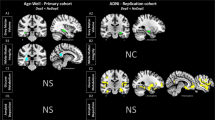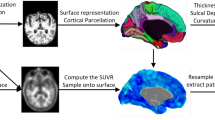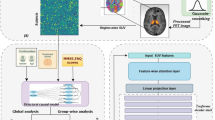Abstract
Two consecutive positron emission scans were done in one session using a double injection method of [18F]2-fluoro-2-deoxyglucose administration to examine the effects of the antimuscarinic drug scopolamine on cerebral glucose metabolism in ten older adults. Scopolamine causes temporary memory impairment, and its effects have been used to model aspects of the cognitive impairment that occur in Alzheimer's disease (AD). Cortical metabolic rates of patients with AD have been reported to be depressed, especially in parietal, temporal, and frontal association areas. After scopolamine administration to the elderly volunteers, absolute and normalized glucose metabolic rates were depressed in prefrontal and occipital regions and increased in parietal-occipital cortical regions and a left middle temporal region. These changes in the older volunteers are generally not consistent with changes seen in AD. We conclude that deficits in muscarinic system function may contribute to some but not all of the hypometabolic changes seen in AD patients.
Similar content being viewed by others
Log in or create a free account to read this content
Gain free access to this article, as well as selected content from this journal and more on nature.com
or
Author information
Authors and Affiliations
Rights and permissions
About this article
Cite this article
Molchan, S., Matochik, J., Zametkin, A. et al. A Double FDG/PET Study of the Effects of Scopolamine in Older Adults. Neuropsychopharmacol 10, 191–198 (1994). https://doi.org/10.1038/npp.1994.21
Received:
Revised:
Accepted:
Issue date:
DOI: https://doi.org/10.1038/npp.1994.21
Keywords
This article is cited by
-
Role of central angiotensin receptors in scopolamine-induced impairment in memory, cerebral blood flow, and cholinergic function
Psychopharmacology (2012)
-
The effects of a benzodiazepine receptor antagonist β-carboline ZK-93426 on scopolamine-induced impairment on attention, memory and psychomotor skills
Psychopharmacology (1996)
-
Differential cholinergic regulation in Alzheimer's patients compared to controls following chronic blockade with scopolamine: a SPECT study
Psychopharmacology (1995)



